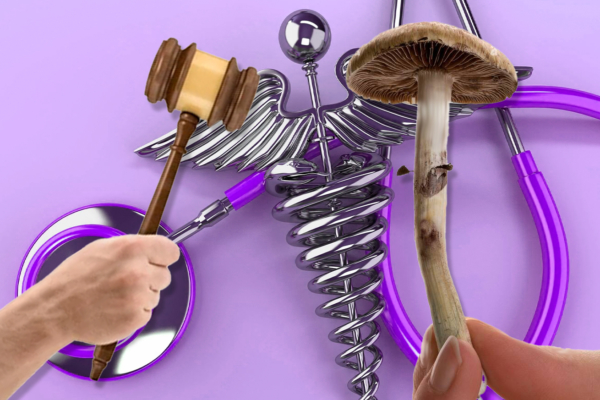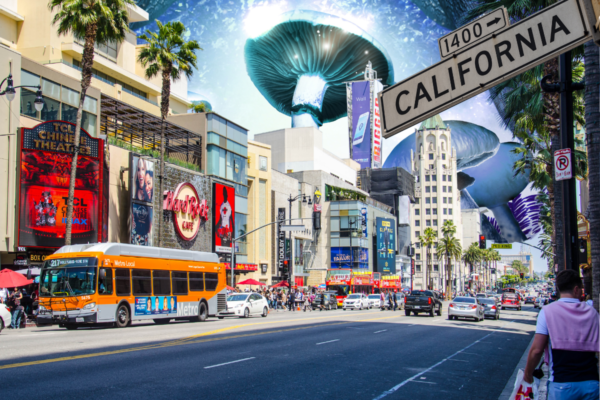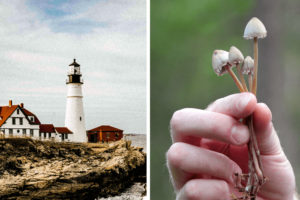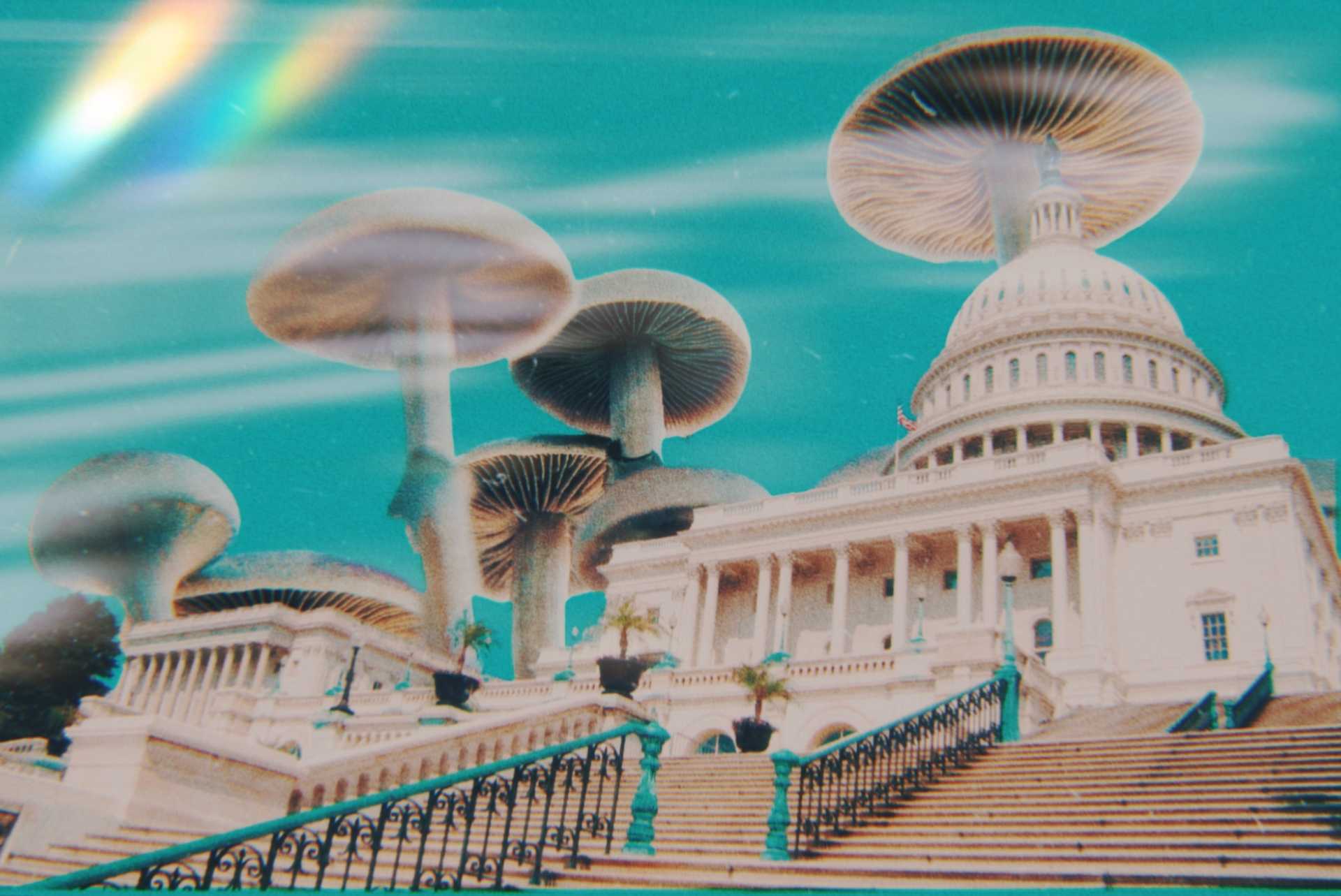
The psychedelic news scene continues to be constantly evolving, with new developments emerging from various states across the country. Recently, a California bill has progressed to the Senate floor that seeks to legalize the possession and facilitated use of certain psychedelic substances. Meanwhile, a Washington State county has voted to decriminalize plant-based psychedelics, another bill has been sent to the Colorado Governor’s desk for approval, and the American Medical Association is issuing a new code for psychedelic therapies. One particularly fascinating piece of psychedelic news revolves around an African plant that has inspired the development of two new depression drugs. With all these recent developments, it’s clear that the world of psychedelics is experiencing a rapidly growing interest and expansion.
California bill advances to Senate floor, focused on legalizing some psychedelic possession and facilitated use
A California bill to legalize the possession of certain psychedelics and facilitated use of the substances is heading to the Senate floor under an accelerated process that is allowing it to skip further committee consideration.
Sen. Scott Wiener (D), the bill’s main sponsor, cleared the Appropriations Committee without a hearing after the chairman invoked a rule to send it straight to the floor.
SB 58 would legalize the “possession, preparation, obtaining, transfer, as specified, or transportation of” specific amounts of psilocybin, psilocyn, DMT, ibogaine and mescaline for personal or facilitated use. Notably, “synthetic” psychedelics like LSD and MDMA would not be legalized, unlike the provisions of the previous version of Wiener’s legislation.
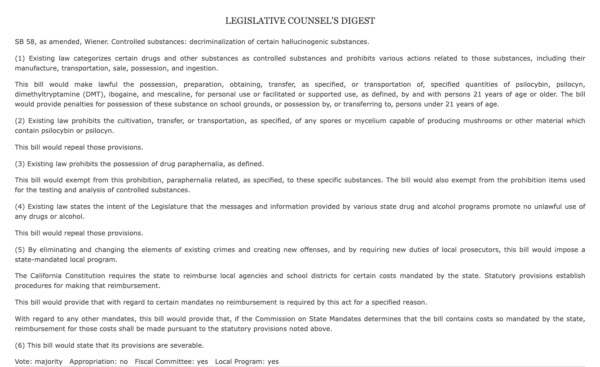
Beside personal possession being legalized, the bill would also specifically provide for “group counseling and community-based healing” involving entheogenic substances.
It would also repeal state law prohibiting “any spores or mycelium capable of producing mushrooms or other material which contain psilocybin or psilocyn.” The state ban on drug paraphernalia for the covered substances would also be eliminated under the legislation.
The “allowable amount” section of the bill prescribes the following psychedelics possession limits:
- DMT—2 grams
- Ibogaine—15 grams
- Psilocybin—2 grams, or up to 4 ounces of “a plant or fungi containing psilocybin”
- Psilocyn—2 grams, or up to 4 ounces of “a plant or fungi containing psilocyn.”
You may also like: California Takes Major Step Towards Passing Psychedelics Legalization Bill
Washington State County votes to decriminalize plant based psychedelics
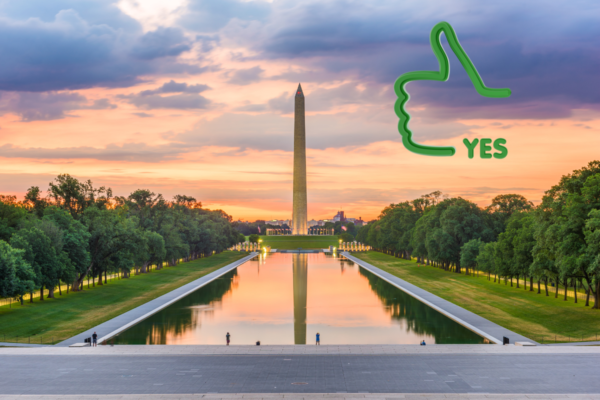
A Washington State County has become the latest U.S. jurisdiction to locally deprioritize enforcement of laws against psychedelics like psilocybin and ayahuasca.
Jefferson County’s Board of Commissioners voted unanimously to approve a resolution making enforcement of psychedelics laws among the jurisdiction’s lowest priorities, while also voicing support for state and federal decriminalization.
Some County law enforcement officials raised concerns about a policy that would restrict them from enforcing state law and also suggested that psychedelics represent a small fraction of cases they handle.
The resolution states that “while recognizing that changing federal or state laws or penalties is beyond the scope of its authority, the Board of Commissioners wishes to acknowledge the healing potentials of entheogens for its local community and to declare its desire not to expend County resources in any investigation, detention, arrest, or prosecution arising out of alleged violations of state and federal law regarding entheogens.”
Additionally, the measure encourages county agencies to “develop nuanced and adaptive responses to the use of controlled substances to include harm reduction strategies, recognition of substance use disorder as a public health issue, and to use the criminal justice system as a pathway to treatment and recovery for individuals and to uphold public safety for our communities.”
Psychedelics regulation bill officially sent to Colorado Governor’s desk
Colorado lawmakers have sent a bill to the governor focused on creating a regulatory framework for psychedelic substances under a voter-approved initiative.
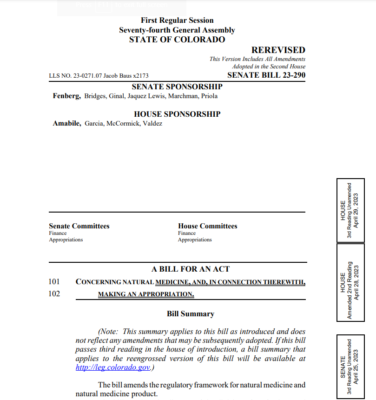
Natural Medicine Regulation And Legalization.
Overall, the bill seeks to set up regulations for a psychedelics legalization law that voters passed at the ballot in 2022, largely focusing on rules for using the substances in licensed healing centers under the guidance of trained facilitators.
The legislation seeks to set policies on “healing centers” where adults 21 and older could receive psychedelic treatment, tighten up rules on cultivation and facilitators, establish licensing requirements, dictate state agency regulatory responsibilities, and impose penalties for unsanctioned activities.
The legislation clarifies that synthetic psychedelics are not permitted. And possessing psychedelics with “hazardous materials” like solvents would be considered a Class 2 felony.
Initially only psilocybin and psilocyn could be administered at healing centers, but regulators could add additional psychedelics. The bill differs from the ballot measure by making it so regulators would be able to authorize the supervised use of ibogaine at the facilities at any time, rather than waiting until at least June 1, 2026, as is the case for mescaline and DMT.
There would be four categories of licenses: healing centers, cultivation facilities, product manufacturers and testing facilities.
The bill maintains the ballot measure’s provisions to block localities from banning healing centers, but says they may enact rules governing time, place, and manner of operations.
American Medical Association to Issue First New Code for Psychedelic Therapies
The American Medical Association (AMA) has approved a Current Procedural Terminology (CPT®) III code for psychedelic therapies. The full details of the code are expected to be released by the AMA sometime in July 2023 and the code will go into effect when it is published on January 1, 2024. It will provide physicians and other qualified healthcare professionals a means to code and seek reimbursement for delivering psychedelic therapies.
On March 3, 2023 the AMA published the Summary of Panel Actions which included the acceptance of the new CPT III code. The application was titled, “Continuous In-Person Monitoring and Intervention during Psychedelic Medication Therapy.” CPT III codes are a set of temporary codes assigned to emerging technologies, services, and procedures. They are intended to be used for data collection to substantiate more widespread usage or to provide documentation for the FDA approval process.
The new code came into being due to efforts pursued by COMPASS Pathways and MAPS Public Benefit Corporation, which are both working on psychedelic-based therapies.
In phase 3, COMPASS is evaluating a psilocybin therapy for treatment-resistant depression. MAPS has finished two phase 3 trials for MDMA-assisted therapy for post-traumatic stress disorder.
African Psychedelic Plant Inspires Two New Depression Drugs
Researchers have developed two novel drug candidates for treating addiction and depression based on ibogaine. Ibogaine, which has been used for thousands of years in shamanistic rituals as a hallucinogen, hunger suppressant, fatigue alleviator, and even as an aphrodisiac, is the main active ingredient in Tabernanthe iboga, a West African shrub found in the Congo and Angola.
Scientists have now developed two new drug candidates for potentially treating addiction and depression, modeled on ibogaine’s pharmacology. In very low doses, these new compounds were able to “blunt” symptoms of both conditions in mice. The findings, published in the journal Cell, were inspired by ibogaine’s impact on the serotonin transporter (SERT), which is also the target of some antidepressant medications.
Using computational methods to identify synthetic drugs capable of mimicking plant-based medicines without adverse side effects is becoming increasingly popular in drug discovery. In cases where the plant is used traditionally by Indigenous populations, synthetic alternatives could mitigate the effects of plant poaching that depletes the reserves available for Native groups.
Check out this published research in Cell.

